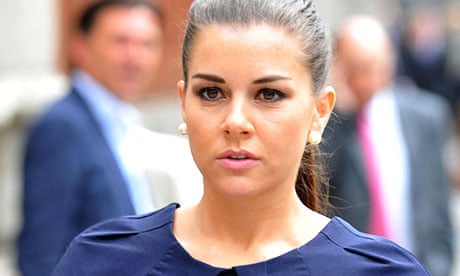The storm over the use of privacy injunctions to suppress publication of celebrity sexual indiscretions has escalated, with a Scottish newspaper revealing the identity of a footballer who allegedly had an affair with the model Imogen Thomas.
Separately, the attorney general is reported to be considering a criminal prosecution against a British journalist who allegedly used Twitter to name a different footballer who has also taken out a privacy injunction.
The Scottish newspaper, which the Guardian cannot name for legal reasons, devoted its front page to a large picture of the footballer's face, with a black band across his eyes and the word "censored" in capital letters. The player is easily recognisable.
Below the picture is the text: "Everyone knows that this is the footballer accused of using the courts to keep allegations of a sexual affair secret. But we weren't supposed to tell you that ..."
In its editorial column, the newspaper wrote: "Today we identify the footballer whose name has been linked to a court superinjunction by thousands of postings on Twitter. Why? Because we believe it is unsustainable that the law can be used to prevent newspapers from publishing information that readers can access on the internet at the click of a mouse.
"Because we believe it unfair that the law can not only be used to prevent the publication of information which may be in the public interest but also to prevent any mention of such a court order. The so-called superinjunction holds no legal force in Scotland where a separate court order is needed. We should point out immediately that we are not accusing the footballer of any misdeed. Whether the allegations against him are true or not has no relevance to this debate."
In an accompanying news story the paper named the footballer as the subject of Twitter speculation, but did not specifically link him to Thomas. The front page, editorial and news story have not been published on the newspaper's website.
The paper's editor said he had taken the decision to identify the footballer hours before the paper went to press after legal advice that the privacy injunction did not apply in Scotland.
"We had a big package in the paper about privacy laws," the editor told the Guardian. "We were looking at how we would portray that on the front page and thought maybe [to show the footballer] pixellated. But then it occurred to me that the injunction would not be in force in Scotland so I took legal advice and the advice was that that was indeed the case and as long as we were not publishing outwith Scotland then we would not be covered by the injunction."
The editor said he had not been approached by the footballer's lawyers, adding that as the newspaper was not publishing the story online - and as no copies were distributed in England - the injunction did not apply.
"His lawyers would need to have a separate injunction granted by a Scottish court, which they could have done. It is not beyond people to do that, but they didn't do it."
On Friday it emerged that the high court had granted a search order against Twitter, in an attempt to compel it to identify those who had named a prominent footballer.
The lawsuit lists the defendants as "Twitter Inc and persons unknown". The "persons unknown" are described as those "responsible for the publication of information on the Twitter accounts".
Lawyers have applied for a court order that could force Twitter to hand over the name, email address and IP address of the person behind each account.
Twitter has said it is unable to comment on the case against it. The order requires Twitter to provide the information within seven days, or within the appropriate time required by the law in California, where it is based.
In a separate development, the attorney general, Dominic Grieve, is reportedly considering criminal prosecution against a journalist who allegedly used Twitter to name a different footballer who had taken out a privacy injunction.
The Mail on Sunday reported that the privacy judge Mr Justice Tugendhat had passed the case to the attorney general. The journalist is believed to write for a prominent British newspaper, but the breach relates to information posted on his personal Twitter account.
The journalist told the Guardian that the first he had heard of the story was when he was approached by the newspaper. "I don't have anything else apart from that [being approached by the Mail] so there's nothing I have to pass an opinion on, because it would be unfair to pass an opinion on superinjunctions and high court judges and all that when I don't even know it's me."
He said he had not been approached by lawyers representing the player, or by the police. "I'm sure all will become clear in the week," he said. "Until somebody comes to me I have nothing to do or say really."
